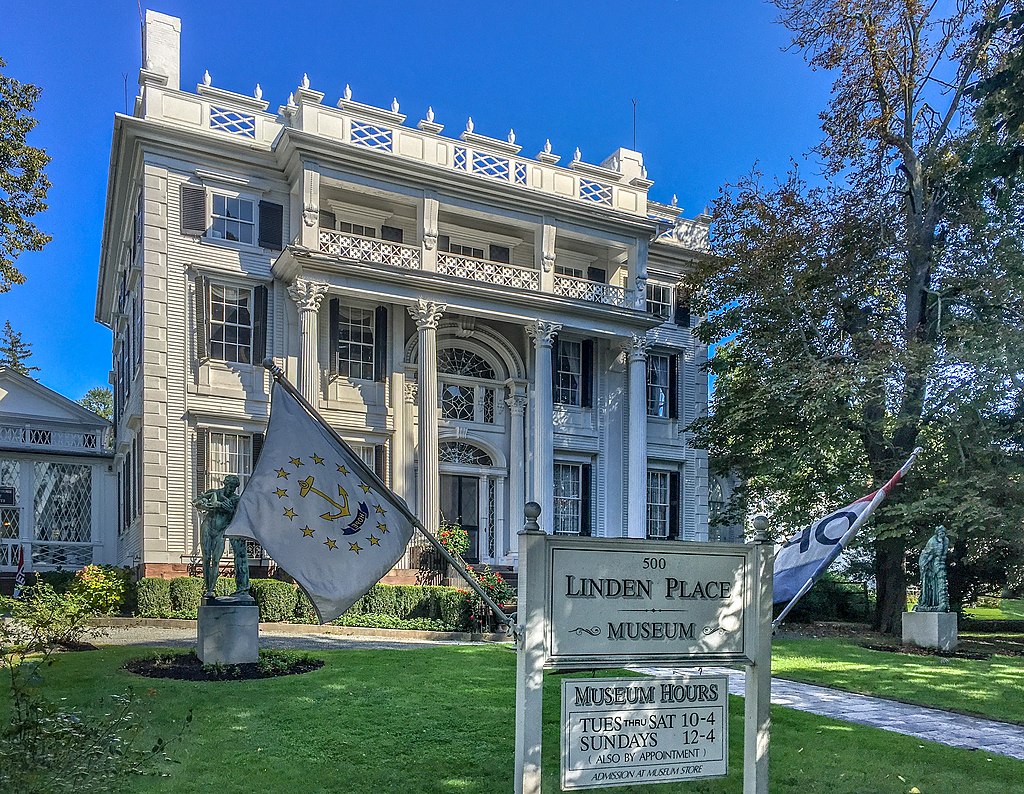
Linden Place, located in Bristol, RI, bears a long history: George DeWolf funded the construction of the mansion in 1810 with money made through the Transatlantic Slave Trade. DeWolf’s grandson, Samuel P. Colt founded Industrial Trust Bank and formed the U.S. Rubber Company, at one time the country’s largest rubber manufacturer. Colt was the nephew of Samuel Colt, the founder of Colt Firearms. Ethel Barrymore, who married into the family in 1909, summered there. The property, which was occupied by DeWolf’s descendants until 1988, is now a historic house museum, event space, and, most recently, the home to the new Linden Place Writers’ Residency.
The Writers’ Residency was founded by local writer Leigh Medeiros. She recognized Linden Place’s complex past could serve as creative inspiration for writers and that a formal program would allow time and space for that work to happen. She approached the site’s Executive Director Susan Battle, who enthusiastically supported the idea of creating a residency.
Funded in part by a grant from the Rhode Island State Council on the Arts, the program is open to writers who meet one of three criteria: Rhode Island serves as a primary residence at least nine months of the year, or live along the Massachusetts border within 25 miles of Linden Place, or attend Roger Williams University as an undergraduate. Applicants submit samples of their work and a letter of intention, which are reviewed by Medeiros, Battle, plus three expert judges, including a Black history scholar. The review committee selects eight writers from across different genres, personal backgrounds, and writing experiences. The residents receive orientations, research support, on-site workspace during the month of April, and a travel stipend. The residency program culminates with a free, public reading on the property, followed by a Q&A.
During the residency, each writer is expected to use Linden Place—be it the physical property or its legacy—as the jumping off point for their work. “One of the brilliant things that the writers do,” says Medeiros, “is take what often feels like very old history and translate it into contemporary pieces that connect the dots to real world issues that we’re facing today.” With social impact at the core of the program, writers address a number of topics, including Black history, queer identity, and gun violence. “We have tended to get writers who have shown up and brought with them a fire and a passion for wanting to look at this difficult past and bring their unique perspective to ways that we haven’t heard before,” continues Medeiros.
Pieces range in genre, tone, and perspective. This year’s work, amongst others, included sestina poems which give voice to those who had been erased from history, including enslaved people; queer, Gothic fantasy set at the turn of the 20th century; speculative fiction which sees Linden Place as an NFT up for auction in a future reality; and, creative nonfiction that explores Samuel P. Colt’s connection to the firearm industry. To ensure that writers are aware of the impact of their work, especially if they are writing from perspectives outside their own, they are provided a sensitivity orientation at the start of the program, as well as a one-on-one session with a sensitivity reader during their tenure.
The Writers’ Residency builds a broader access point for a more diverse audience at Linden Place. House museums have historically focused on the known stories of their owners and residents, which, more often than not, leave out BIPOC, queer, and female voices. “My intention is to open the door wider for people who have lived experiences or a particular angle on the history here, [and make them] feel comfortable and safe to come in,” says Medeiros. The residency creates space for writers and their readers to experience Linden Place through different perspectives and to hear about people who may have been lost in time. “We want writers to look at some of the really complicated and frankly dark history here, which is also the history of America,” says Medeiros, “and bring their personal lens to that and translate that in a way that the audience can have these ‘a-ha’ moments and different revelations.”
The writers’ creative re-envisioning of the site allows new and exciting points of entry for the wider community as well. “Not everyone is immediately drawn to historic house museums,” says Battle. “So when I look out at the audience of the public reading and see hardly anyone I know, I’m so excited. We have a whole new audience that may not have, three years ago, stepped onto our property.”
Details on how to visit Linden Place this summer, as well as how to apply for the 2024 Writer’s Residency, can be found at lindenplace.org.
Jennifer M. Wilson has worked in Providence’s arts and humanities sector for over 12 years, including at the Rhode Island Historical Society, Trinity Rep, and Gallery Night Providence.

